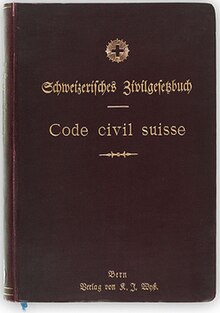Swiss Civil Code

The Swiss Civil Code (Template:Lang-de; Template:Lang-fr; Template:Lang-it; Template:Lang-rm) is the codified law ruling in Switzerland and regulating relationship between individuals. It was first adopted in 1907 (effective since 1 January 1912).
It was largely influenced by the German civil code, and partly influenced by the French civil code, but the majority of comparative law scholars (such as K. Zweigert and Rodolfo Sacco) argue that the Swiss code derives from a distinct paradigm of civil law.
History and influences
Adopted on 10 December 1907 (and is thus formally known as the "Swiss civil code of 10 December 1907"), and in force since 1912. It was created by Eugen Huber, it was subsequently translated in the two other national languages (at the time Romansh was not official) by Virgile Rossel and Brenno Bertoni for French and Italian, respectively.
The civil code of the Republic of Turkey is a slightly modified version of the Swiss code, adopted in 1926 during Mustafa Kemal Atatürk's presidency as part of the government's progressive reforms and secularization.[1]
In 1911, the Swiss Code of Obligations was adopted and considered as a part of the Swiss Civil Code (part five). It thus became the first civil code to include commercial law.[2]
Notes and references
- "Swiss Civil Code". Britannica Online Encyclopedia. Retrieved 19 January 2009.
- "Turkey and the adoption of the Swiss Civil Code". Federal Department of Justice and Police. Retrieved 19 January 2009.
- ^ Turkey and the adoption of the Swiss Civil Code, speech by Christoph Blocher given on the occasion of the opening of the symposium at Ankara University on 4 October 2006.
- ^ Template:Fr Frédéric Koller, "Quand la Suisse inspire la modernisation du droit chinois", Le temps, Tuesday 13 September 2016 (page visited on 14 September 2016).
